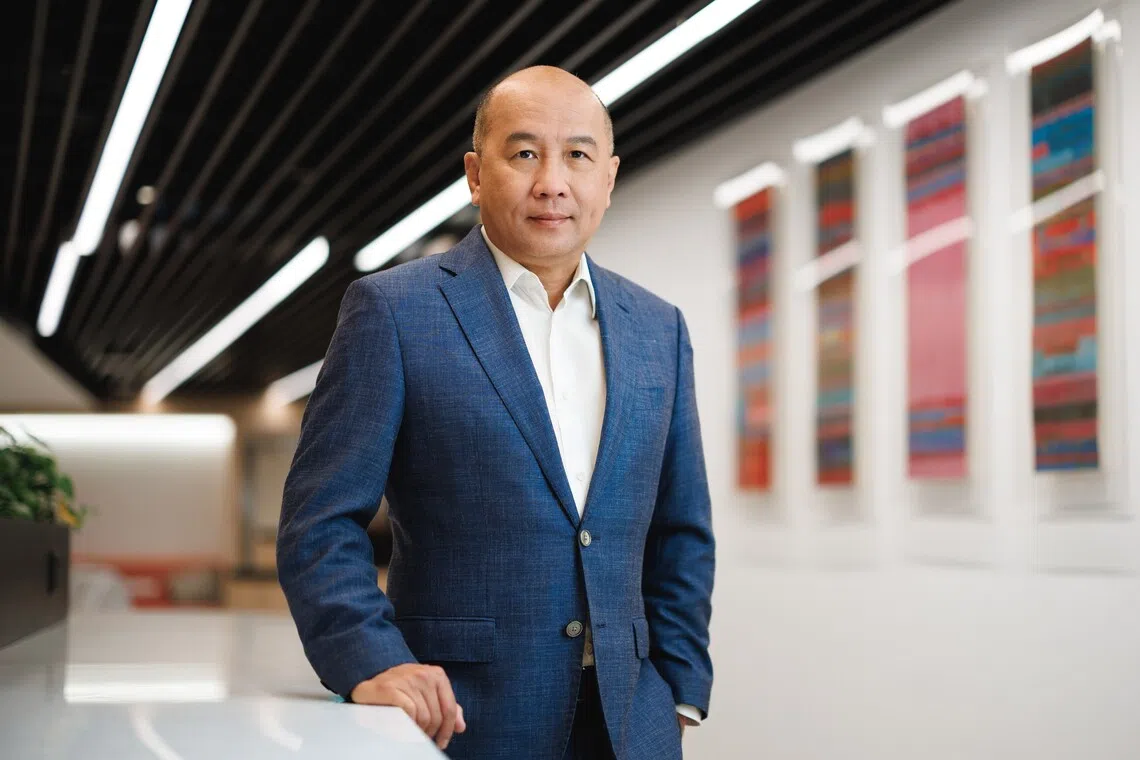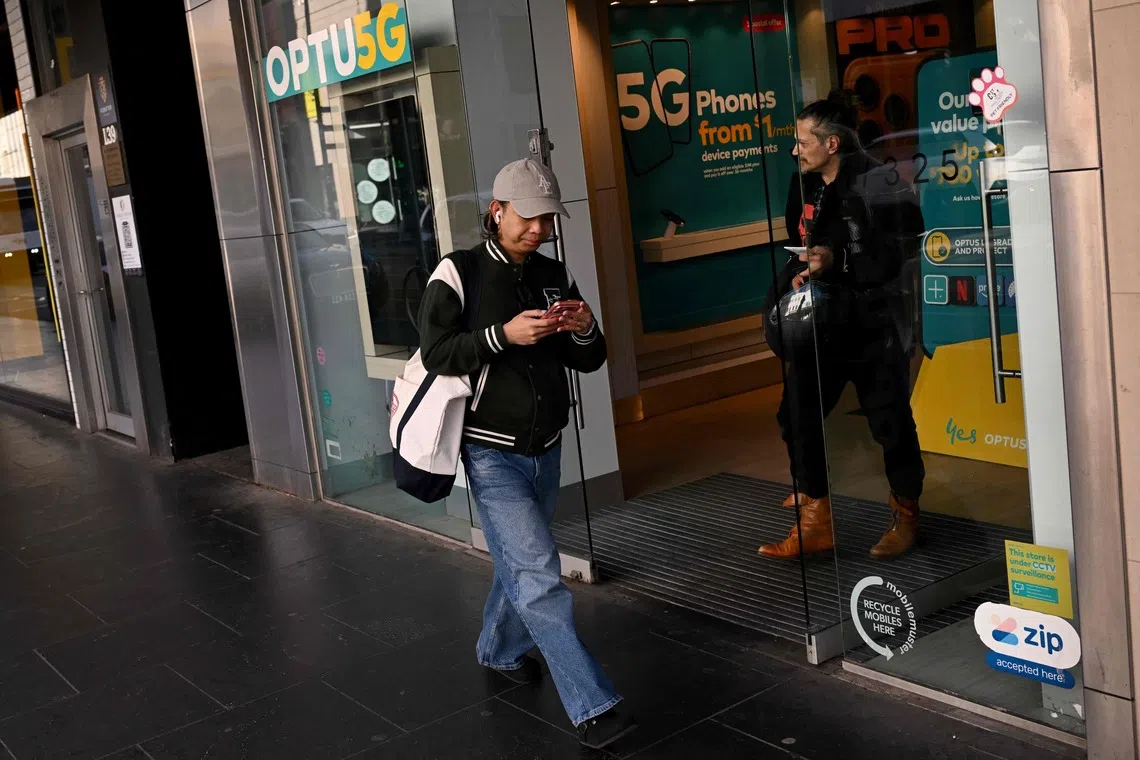Singtel pledges support for troubled long-time unit Optus; transformation ‘will take time’
The group has supported its Australian subsidiary with A$33 billion in investments since 2001, while not receiving dividends in the last five years

[SINGAPORE] Amid widespread concern over a September emergency hotline outage at Optus which has been linked to three fatalities, Singtel has expressed its commitment to tackling the underlying problems at its wholly-owned Australian subsidiary.
A key step is the appointment of global consulting firm Kearney to provide independent additional oversight of the Optus mobile network.
This was announced on Sep 30 by Optus chairman John Arthur, following a meeting with Australia’s Communications Minister Anika Wells, Singtel Group chief executive officer Yuen Kuan Moon, and Optus CEO Stephen Rue.
Yuen told The Business Times: “We’ve always respected the laws and regulations of the jurisdictions we operate in, and will cooperate fully with the Australian authorities to improve. We will also fully assist and cooperate with the independent panel to find the root causes and rectify the issues.”
He added: “We will continue to fully support the Optus board and management as they work through this incident and accelerate the changes needed. We are committed to the continued transformation of Optus to improve the processes and resilience of the company, and improve the reliability of critical services.”

His comments came in the wake of an outage on Sep 18, during which users were unable to make Triple Zero or emergency calls. Some 600 people across South Australia, Western Australia and the Northern Territory were affected for more than 10 hours.
Navigate Asia in
a new global order
Get the insights delivered to your inbox.
Another outage on Sep 28 was much smaller in scale, involving one out of more than 9,000 mobile cell sites or towers across Australia.
But there have been other high-profile incidents in recent years, including a misselling case involving vulnerable consumers, a nationwide outage in 2023, and a data cyberattack in 2022.
These incidents have sparked harsh criticism of Singtel, including suggestions that it has underinvested in Optus and been hands-off in managing the subsidiary.
The telco’s shares have lost ground since reaching this year’s high of S$4.41 in September. On Friday (Oct 3), Singtel closed S$0.05 or 1.2 per cent higher at S$4.25. Year to date, the counter is up some 37 per cent.
Incidents at Optus
2022: Optus suffers a cyberattack affecting the data of 9.8 million subscribers.
2024: Optus is fined A$12 million (S$10.2 million) by regulators for failing to provide emergency call services to thousands in a nationwide outage in 2023, when its mobile services were unavailable for more than 12 hours.
Sep 18, 2025: An outage leaves some 600 people across South Australia, Western Australia and the Northern Territory unable to make emergency calls for more than 10 hours. Three deaths are linked to this inability to make emergency calls.
Sep 24, 2025: A federal court orders Optus to pay a A$100 million fine for sales misconduct involving vulnerable consumers.
Sep 28, 2025: Some customers in a New South Wales town cannot make emergency calls due to an incident involving one out of more than 9,000 mobile cell sites or towers.
Financial backing
On the financial front, Singtel has pumped billions of dollars into Optus. Since acquiring it in 2001, the group has supported Optus in investing A$33 billion (S$28.1 billion) in capital expenditure and spectrum.
That figure includes A$9.3 billion in the past five years, much of which went to building network infrastructure, including the deployment of 5G networks in regional parts of Australia.
Customers in these areas are set to enjoy better coverage, following Optus’ recent network-sharing arrangement with fellow Aussie telco TPG Telecom that will accelerate the 5G roll-out.
Singtel has not received dividends from Optus in the past five years, in yet another move to strengthen the subsidiary’s financial standing.
On Oct 2, the Sydney Morning Herald reported that Optus was among several large companies in Australia flagged for not paying corporate tax. But this is because Optus is loss-making at the net profit level due to infrastructure and operating expenses, despite accounting for a significant share of group revenue.
For the financial year ended Mar 31, 2025, Optus’ revenue of A$8.2 billion represented roughly half that of the Singtel Group. The subsidiary was last profitable in FY2020.
Management of Singtel’s overseas investments
While Singtel is a fully committed shareholder, its approach has been one of empowering local management, said Yuen.
Investee companies such as Optus have their own boards with independent directors, with management teams reporting directly to the boards.
“We are an active long-term shareholder and responsible steward, and our objective has always been to build a strong Australian company for Australians, run by Australians,” the Singtel Group CEO said.
On Optus’ board of directors, for instance, five out of seven members are Australian and established business leaders in their own right. The remaining two are from Singapore: Yuen and independent director Nicky Tan, who was on the Singtel board during the Optus acquisition.
Even before the recent outages, the board met some eight to 10 times a year.

While some critics attribute the unit’s problems to Singtel’s “remote control” approach, Yuen said: “We meet regularly to discuss strategic imperatives, share best practices and, where we can, we collaborate and learn from each other. But execution, decision-making, how to compete, how to operate, should be at the local level.”
He added: “The local operating environment can be very different from country to country. Licensing, regulations and competition rules, they are all different. You can’t be making decisions in Singapore, 6,000 km away.”
In earlier media reports, Optus chairman Arthur had said: “After the previous crises, Singtel and Optus recognised that it was better not to have a divisionalised, highly matrix structure, where Optus was ultimately reporting into a Singapore structure.
“It was better for governance and the management responsible to be close together in Australia. Changing the operating model hasn’t fixed all the problems, but the transformation programme will do so.”
Long-time units of Singtel
Just as Optus has been part of Singtel since 2001, the group’s stakes in other regional units were also acquired decades ago.
Singtel first invested in the Philippines’ Globe Telecom in 1993, helping to establish the country’s first mobile phone operator. In 1999 came AIS, now Thailand’s largest mobile operator. Stakes followed in India’s Airtel in 2000, and Indonesia’s Telkomsel in 2001.
Yuen said: “We have been in our respective markets for some 20, almost 30 years, and we have stayed true to our investments. We believe in our markets and in supporting the communities where we operate. That’s why we stay invested, even though sometimes it’s challenging.”
Together with its local partner, Airtel has grown from just under one million subscribers to more than 300 million today.
These regional players started small but now hold leading positions in their home markets.
“We have always adopted a long-term, strategic approach to all our investments across the Asia-Pacific,” said Yuen. “Where required, we’ve provided strategic direction, financial support, technical know-how and best practices-sharing to all businesses.”
As a long-term shareholder, Singtel has seen its investee companies through the ups and downs of market cycles, providing strategic oversight to support their growth.
“We also encouraged diversification away from the core mobile business by going into new growth areas like fixed broadband, enterprise and digital infrastructure since the group’s strategic reset,” Yuen added.
Singtel’s support extends to dipping into its pockets when associates require capital. In 2019, it participated in Airtel’s rights issue, contributing some S$700 million. In 2022, it injected S$200 million into Globe’s rights issuance.
It also supported Airtel during a challenging period in the late 2010s. Today, that company is still standing strong even as other competitors have faded from the scene, with the entry of Reliance Jio seeing the market consolidate to three players from 14 previously.
Fixing issues “will take time”
After the Sep 18 incident, Yuen said Singtel Group was deeply sorry, adding: “Our hearts go out to the families and friends of those who have passed away, and we know that Optus will get to the bottom of this matter.”
“Some have said that we expanded too fast,” the CEO told BT. “But with (Optus CEO Rue), he’s put together a good team and a strategy, a five-year plan with various targets. It requires investment and we are fully committed to supporting the five-year plan.”
In 2024, Singtel provided A$2.5 billion to Optus to invest in network and services to enhance coverage as well as improve reliability.
Rue has been on board as CEO only since November 2024. Prior to that, there was an interim CEO after Kelly Bayer Rosmarin resigned from the top job in November 2023.
As former CEO of Australia’s government-owned National Broadband Network (NBN), Rue possesses the requisite credentials, having led the nation’s broadband roll-out to completion.
The management team has also been addressing the misselling. Yuen noted that Rue has focused on selling practices and taken back control of stores previously run by third parties.
Even as critics point fingers at underinvestment and the outsourcing of technical talent, Yuen attributed the Sep 18 incident to “process lapses”, adding: “We await the findings of the independent panel and will address the issues expeditiously.” Processes were allegedly not followed at a call centre in India, during a network firewall upgrade.
Investigations are under way. Apart from appointing Kearney for independent oversight of the network, the Optus board commissioned former NBN director Kerry Schott to lead an independent review into the Sep 18 failure, with results expected before the end of the year.
Yuen added: “We are committed to earning trust back from customers and the Australian public. It will take time, but we are deeply committed to doing this.”
Meanwhile, a separate probe is being undertaken by the industry regulator, the Australian Communications and Media Authority.
As investigations continue, the question is whether consumers and other stakeholders in Australia will have the patience to wait for Optus’ transformation to succeed.
Decoding Asia newsletter: your guide to navigating Asia in a new global order. Sign up here to get Decoding Asia newsletter. Delivered to your inbox. Free.
Copyright SPH Media. All rights reserved.


